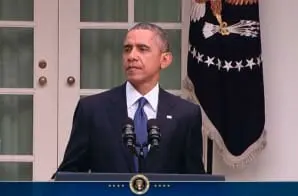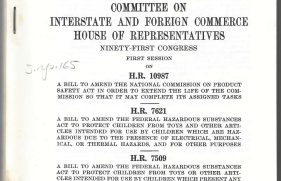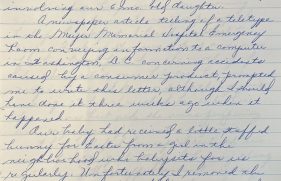Good morning.
Our nation was founded on a bedrock principle that
we are all created equal.
The project of each generation is to bridge the meaning of
those founding words with the realities of changing times
— a never-ending quest to ensure those words
ring true for every single American.
Progress on this journey often comes in small
increments, sometimes two steps forward, one step back,
propelled by the persistent effort of dedicated citizens.
And then sometimes, there are days like this when that slow,
steady effort is rewarded with justice that arrives
like a thunderbolt.
This morning, the Supreme Court recognized that
the Constitution guarantees marriage equality.
In doing so, they’ve reaffirmed that all Americans
are entitled to the equal protection of the law.
That all people should be treated equally,
regardless of who they are or who they love.
This decision will end the patchwork system
we currently have.
It will end the uncertainty hundreds of thousands of
same-sex couples face from not knowing whether their
marriage, legitimate in the eyes of one state,
will remain if they decide to move [to]
or even visit another.
This ruling will strengthen all of our communities
by offering to all loving same-sex couples
the dignity of marriage across this great land.
In my second inaugural address, I said that if we are truly
created equal, then surely the love we commit
to one another must be equal as well.
It is gratifying to see that principle enshrined into
law by this decision.
This ruling is a victory for Jim Obergefell and the other
plaintiffs in the case.
It’s a victory for gay and lesbian couples who have
fought so long for their basic civil rights.
It’s a victory for their children,
whose families will now be recognized as equal
to any other.
It’s a victory for the allies and friends and supporters
who spent years, even decades, working and praying
for change to come.
And this ruling is a victory for America.
This decision affirms what millions of Americans
already believe in their hearts: When all Americans
are treated as equal we are all more free.
My administration has been guided by that idea.
It’s why we stopped defending the so-called
Defense of Marriage Act, and why we were pleased when
the Court finally struck down a central provision
of that discriminatory law.
It’s why we ended “Don’t Ask, Don’t Tell.”
From extending full marital benefits to federal employees
and their spouses, to expanding hospital visitation
rights for LGBT patients and their loved ones,
we’ve made real progress in advancing equality for LGBT
Americans in ways that were unimaginable not too long ago.
I know change for many of our LGBT brothers
and sisters must have seemed so slow for so long.
But compared to so many other issues,
America’s shift has been so quick.
I know that Americans of goodwill continue
to hold a wide range of views on this issue.
Opposition in some cases has been based on sincere
and deeply held beliefs.
All of us who welcome today’s news should be mindful
of that fact; recognize different viewpoints;
revere our deep commitment to religious freedom.
But today should also give us hope that on the many
issues with which we grapple, often painfully,
real change is possible.
Shifts in hearts and minds is possible.
And those who have come so far on their journey to equality
have a responsibility to reach back and help others join them.
Because for all our differences, we are one people,
stronger together than we could ever be alone.
That’s always been our story.
We are big and vast and diverse; a nation of people
with different backgrounds and beliefs,
different experiences and stories,
but bound by our shared ideal that no matter who
you are or what you look like, how you started off,
or how and who you love, America is a place
where you can write your own destiny.
We are a people who believe that every single child
is entitled to life and liberty and the pursuit of happiness.
There’s so much more work to be done to extend
the full promise of America to every American.
But today, we can say in no uncertain terms that
we’ve made our union a little more perfect.
That’s the consequence of a decision from the Supreme Court,
but, more importantly, it is a consequence of the countless
small acts of courage of millions of people
across decades who stood up, who came out,
who talked to parents — parents who loved their
children no matter what.
Folks who were willing to endure bullying and taunts,
and stayed strong, and came to believe in themselves
and who they were, and slowly made an entire country
realize that love is love.
What an extraordinary achievement.
What a vindication of the belief that ordinary
people can do extraordinary things.
What a reminder of what Bobby Kennedy once said about how
small actions can be like pebbles being thrown into
a still lake, and ripples of hope cascade outwards
and change the world.
Those countless, often anonymous heroes —
they deserve our thanks.
They should be very proud.
America should be very proud.
Thank you.
(applause)




